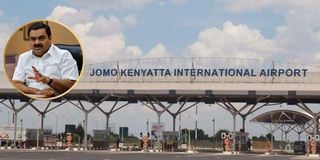Premium
Adani, JKIA deal dispute referred to Chief Justice

Indian billionaire Gautam Adani (inset).
What you need to know:
- KHRC and LSK challenged the deal arguing that JKIA is a strategic and profitable national asset.
- According to the petitioners, the planned deal would deprive the public of all the current revenues.
The High Court has referred one of the petitions challenging plans to hand Jomo Kenyatta International Airport to Adani Group to Chief Justice Martha Koome, for appointment of a bench of three judges to determine the 30-year deal.
Justice John Chigiti said the case by Law Society of Kenya and Kenya Human Rights Commission (KHRC), raises serious constitutional issues as he referred the file to the CJ.
KHRC and LSK challenged the deal arguing that JKIA is a strategic and profitable national asset and the deal is, therefore, irrational and violates the principles of good governance, accountability, transparency, and prudent and responsible use of public money.
“The matter is hereby forwarded to the honourable Chief Justice for empanelment of a bench,” said the judge.
The two organisations have challenged the deal arguing that it would deprive the public of, and transfer to Adani, all the current revenues, receipts, expenditures and other financial transactions over JKIA.
The LSK further said although the project is dubbed a Build Operate Transfer, Kenya Airports Authority (KAA) would be handing over an existing and operational airport to Adani and at the end of the 30 years, Adani would, in perpetuity, retain an 18 percent equity stake in the aeronautical business at JKIA.
“Thus, after 30 years, Adani would be entitled to an 18 per cent concession fee starting at Sh6 billion and increasing by 10 per cent every five years forever. In this way, the Adani proposal violates Article 201(c), demanding that the burden and benefits of using resources and public borrowing be shared equitably between present and future generations,” the LSK said.
Adani Group had opposed the case being heard by the High Court, holding that the dispute should be handled by the Public Private Partnership Petition Committee.
The firm said the Public Private Partnerships Act establishes the petition committee with the powers to hear and determine any petitions regarding the decisions of the Public Private Partnership Committee, the directorate of public private partnership or a contracting authority.
“The applicants have failed to exhaust the dispute resolution mechanism stipulated in the law and therefore, this court lacks jurisdiction to hear and determine this matter,” Adani Enterprises Ltd said.
The company had also submitted that the case was premature as it sought to stop a project that is still at the due-diligence stage and yet to be approved.
In documents filed in court, the Indian conglomerate revealed that it sent the PIP to KAA on March 1, 2024 and 17 days later, the application was cleared and the firm was given the greenlight to proceed with the feasibility study.
Ten days later, on March 28 the company provided the feasibility study report detailing the environmental and social impact of the project, the financial plan and how the Kenyan public will get value for money, from the PIP project.
“Having considered the documents submitted, KAA is now engaged in negotiations on the next phase of the project,” Mr Alok Patni, the firm’s authorised signatory said.
The company revealed that it also provided a preliminary operating plan for the project and the report confirmed that the project was aligned with the national infrastructure priorities as it was aimed at curbing the perennial infrastructure flaws and deterioration that has been witnessed at JKIA.





